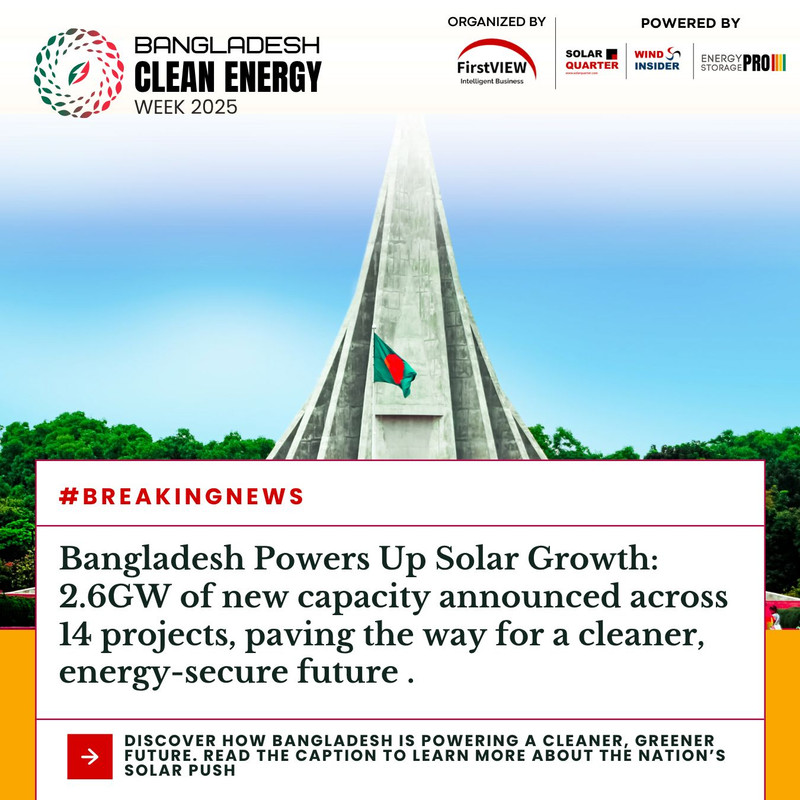Loading...
newsTicker.loading • newsTicker.loading
newsTicker.loading • newsTicker.loading
Loading...
Arthur Rahman
EcoBangla Correspondent
October 14, 2025
410
0

The tender covers 14 solar projects ranging between 105–250MW each, all strategically located near grid substations to facilitate efficient integration into the national power network. Successful bidders will receive 20-year Power Purchase Agreements (PPAs), providing long-term investment security and predictable returns that are essential for attracting both domestic and international renewable energy developers. This announcement follows a series of earlier tenders totaling 2.2GW already issued in 2025, demonstrating Bangladesh's accelerating commitment to clean energy transformation. Combined, these initiatives represent nearly 5GW of solar capacity—a dramatic scaling up of the nation's renewable energy infrastructure.
With renewables contributing just 1.8% of national power generation in 2024, Bangladesh faces a significant challenge in diversifying its energy mix away from fossil fuel dependence. The country's electricity generation has historically relied heavily on natural gas and imported coal, creating both energy security vulnerabilities and environmental concerns. The new 2.6GW solar tender represents a substantial leap toward sustainability and energy independence. If successfully implemented, these projects could more than triple Bangladesh's current renewable energy capacity, fundamentally reshaping the national power sector. The strategic placement of solar installations near existing grid substations reflects sophisticated planning aimed at minimizing transmission losses and infrastructure costs. This approach maximizes the efficiency of renewable energy integration while reducing the technical barriers that have historically slowed solar adoption in developing nations.


Bangladesh's solar ambitions align with global climate commitments and the urgent need for climate-vulnerable nations to transition toward low-carbon development pathways. As one of the countries most severely affected by climate change impacts including sea-level rise, cyclones, and flooding, Bangladesh has both moral authority and practical necessity driving its renewable energy transition. The 20-year PPA structure provides crucial investment certainty for developers, addressing one of the primary obstacles to renewable energy deployment in emerging markets. Long-term contracts allow companies to secure financing, plan operations, and commit to technology investments with confidence in stable revenue streams. Solar energy offers particular advantages for Bangladesh's energy challenges. The country receives abundant sunlight throughout much of the year, providing a reliable renewable resource. Solar installations can be deployed relatively quickly compared to conventional power plants, and they require minimal water resources—a significant benefit in a nation where freshwater availability is increasingly constrained by salinity intrusion and seasonal variability. The cumulative 4.8GW of solar tenders issued in 2025 signals a fundamental shift in Bangladesh's energy policy, moving from pilot projects and modest renewable targets toward industrial-scale clean energy deployment. This transformation positions Bangladesh as a regional leader in South Asia's renewable energy transition, potentially serving as a model for other climate-vulnerable developing nations seeking to balance economic growth with environmental sustainability. As Bangladesh continues to grapple with climate impacts including the current devastating flood situation in northern districts, the move toward renewable energy represents both a climate mitigation and adaptation strategy—reducing the nation's contribution to global emissions while building a more resilient and diversified energy infrastructure for the future.
Join the conversation and share your thoughts!
Be the first to share your thoughts!